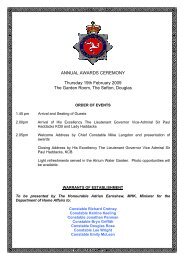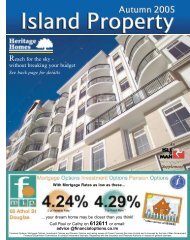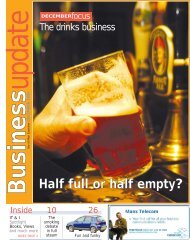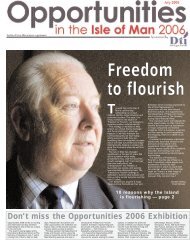14 Business update<strong>Isle</strong> <strong>of</strong> <strong>Man</strong> Examiner, May 2005<strong>Isle</strong> <strong>of</strong> <strong>Man</strong> Examiner, May 2005 Businessupdate15TOPICMAYspecialreportDIVORCEGoing to court is not<strong>the</strong> only way to settlea divorce. Mediationcould be a moreamicable, and costeffective,answer asJohn Sherrocksdiscovers.With your pension sorted,relax about <strong>the</strong> futureTrust-based pension schemes for:• Companies• Individuals• DirectorsAfiercely contested divorce cancost tens <strong>of</strong> thousands <strong>of</strong>pounds with <strong>the</strong> legal feesmounting as a result <strong>of</strong> <strong>the</strong> case having to goto court. The solution is to avoid ending upbefore a deemster — obvious but not alwaysfeasible when bitterness and anger cloudsrationale.Often, even when a couple are looking topart as amicably as possible <strong>the</strong>y are not ableto agree on <strong>the</strong> financial arrangements. Thisis <strong>the</strong> cue for <strong>the</strong> lawyers to get involved.Aha, cry <strong>the</strong> cynics — <strong>the</strong> first step to endingup in court. An assumption which JonathanKewley <strong>of</strong> Dickinson, Cruickshank and Co.and Kevin O’Riordan <strong>of</strong> Simcocks reject. Bothpr<strong>of</strong>ess to be as keen as clear-thinking clientsare to avoid having <strong>the</strong> courts ruling on adivorce.Being in court tends to polarise attitudesand force couples to accentuate <strong>the</strong>irdifferences. It can also result in lawyersconcentrating on where <strong>the</strong> differences lie inpreparing for a case. Having a deemster orjudge ruling on a divorce is also costly for <strong>the</strong>state, which is why governments are anxiousto encourage couples to adopt a nonadversarialapproach.The whole environment has changed inrecent years. Three decades ago, a divorcehad to be contentious. Back <strong>the</strong>n, marriedcouples who wanted to get divorced had toresort to desperate methods; one <strong>of</strong> <strong>the</strong>spouses would arrange to be found in a hotelbed with a pr<strong>of</strong>essional co-respondent by achambermaid bringing in breakfast. Thechambermaid signed <strong>the</strong> affidavit and hotelsin B<strong>right</strong>on did roaring trade.Divorces can now be granted purely on <strong>the</strong>grounds <strong>of</strong> separation; two years in caseswhere both partners want to formally end<strong>the</strong> marriage and five years where one isopposed.Adultery or unreasonable behaviour is stillcited in divorce cases — sometimes withfingers crossed in situations where bothpartners want a speedy divorce.‘Court is always <strong>the</strong> last resort,’ saysDickinson Cruickshank’s Mr Kewley.‘If it [<strong>the</strong> divorce] is amicable and <strong>the</strong>parties have agreed between <strong>the</strong>mselveswhat happens to <strong>the</strong> children, <strong>the</strong> propertyetc, <strong>the</strong>n a lawyer is only needed to draw upa separation agreement … that is relativelyinexpensive because <strong>the</strong>y [<strong>the</strong> couple] havedone all <strong>the</strong> work <strong>the</strong>mselves,’ he explains.If <strong>the</strong> couple cannot agree on how <strong>the</strong>finances are to be split <strong>the</strong>n <strong>the</strong>ir respectivelawyers will try to do so on <strong>the</strong>ir behalf.Hopefully agreement is reached speedily.The courts cannot rule on <strong>the</strong>redistribution <strong>of</strong> finances until after <strong>the</strong>divorce. Prior to that <strong>the</strong> courts have somelimited powers to ensure that <strong>the</strong> wife hassufficient maintenance, <strong>the</strong> children areBreaking up is hard to doprovided for etc. A non-adversarialalternative to <strong>the</strong> divorce courts that mostlawyers recommend is mediation. Althoughboth parties normally have <strong>the</strong>ir own legalrepresentation, mediation is generallycheaper than going to court.‘The o<strong>the</strong>r advantage <strong>of</strong> mediation is that<strong>the</strong> people have chosen <strong>the</strong>ir own solution …<strong>the</strong>y have ownership <strong>of</strong> it,’ says Mr Kewley.There is no obligation to take <strong>the</strong>mediator’s advice and if this route fails <strong>the</strong>couple can still turn to <strong>the</strong> courts, safe in <strong>the</strong>knowledge that what was said duringmediation will not be quoted against <strong>the</strong>m.Kevin O’Riordan <strong>of</strong> Simcocks is one <strong>of</strong> justa couple <strong>of</strong> trained matrimonial mediators“If <strong>the</strong> divorceis amicableand <strong>the</strong> partieshave agreedbetween<strong>the</strong>mselveswhat happensto <strong>the</strong>children, <strong>the</strong>property etc,<strong>the</strong>n a lawyeris only neededto draw up aseparationagreement“Jonathan Kewleybased in <strong>the</strong> <strong>Isle</strong> <strong>of</strong> <strong>Man</strong>.He says <strong>the</strong> UK government started activelyencouraging mediation in divorce around 20years ago for two primary reasons: to cut itslegal aid bill and <strong>of</strong>fer a ‘more appropriate’alternative to <strong>the</strong> courts.‘There was no real facility for helpingpeople to get to grips with <strong>the</strong>ir anger and all<strong>the</strong> emotional fallout [that can go withdivorce].’Mr O’Riordan says: ‘When I’m advisingpeople I try to give <strong>the</strong>m strategies forcommunicating with one ano<strong>the</strong>r. Theclassic thing is find neutral territory and apositive atmosphere. Don’t try to discusssomething over <strong>the</strong> phone when one <strong>of</strong> youis distracted or worse still when you arehanding over <strong>the</strong> children on <strong>the</strong> doorstep.‘When people are divorcing <strong>the</strong>y <strong>of</strong>tendon’t normally want to have anything to dowith each o<strong>the</strong>r. Whoever is shouting <strong>the</strong>loudest is probably feeling <strong>the</strong> guiltiest.There is a tremendous loss <strong>of</strong> face, a blow to<strong>the</strong> ego in any divorce … both [people] wentinto marriage intent on making it work but ithas come unglued and [<strong>the</strong>y] … think <strong>the</strong>reare a few things I could have playeddifferently over <strong>the</strong> years.‘Despite that, most people after shouting ateach o<strong>the</strong>r for a bit are able to calm downand sort things out. I have people come inand say we've virtually reached agreement —can you dot <strong>the</strong> i’s and cross <strong>the</strong> t’s.’That said, Mr O’Riordan concedes that in<strong>the</strong> <strong>Isle</strong> <strong>of</strong> <strong>Man</strong> relatively little divorcemediation takes place. However, he believesthat younger advocates coming through <strong>the</strong>ranks will be more inclined to employmediation.A new non-adversarial alternative to <strong>the</strong>divorce courts that is starting to emerge in<strong>the</strong> UK is ‘collaborative law’. Imported from<strong>the</strong> US, collaborative law involves twolawyers setting out to reach agreement bynegotiation. Should <strong>the</strong>y fail, <strong>the</strong> two parties<strong>the</strong>n have to appoint different lawyers torepresent <strong>the</strong>m in court.Although collaborative law is being toutedas a better alternative, Mr O’Riordanquestions whe<strong>the</strong>r it is not just a more costlyversion <strong>of</strong> traditional mediation.‘I can’t buy into <strong>the</strong> idea that a lawyer whonegotiates can’t also be a lawyer who fights… so <strong>the</strong> concept <strong>of</strong> somehow not being ableto do both jobs in a matrimonial situation tome is completely alien.‘I’ve always thought that if you’ve got twogood lawyers you should be able to settle justabout any case because you are going toknow it better, you’re going to know <strong>the</strong>clients better [than <strong>the</strong> deemster], you’regoing to be able to have a feel for where <strong>the</strong>give is.’Mr O’Riordan suspects collaborative lawcan be more expensive than mediation if itfails and no cheaper if successful.“When I’m advising people I tryto give <strong>the</strong>m strategies forcommunicating with oneano<strong>the</strong>r. The classic thing is findneutral territory and a positiveatmosphereKevin O’Riordan“
16 Business update<strong>Isle</strong> <strong>of</strong> <strong>Man</strong> Examiner, May 2005ISSUEMAY focusWORK-LIFE BALANCETackling stress inFeatureseditorJohn Quirkturns hisattention tostress in <strong>the</strong>workplaceOVER a beer one night, I wasexplaining to a friend that Iwas writing an article aboutstress in <strong>the</strong> workplace.He responded with a shake <strong>of</strong> <strong>the</strong> headand a comment which suggested hethought <strong>the</strong> issue was an excuse which lazyworkers use when faced with a bit morework than usual and <strong>the</strong> thought <strong>of</strong> havingto pull <strong>the</strong>ir finger out.Society may have undergone some radicalchanges in recent decades, but <strong>the</strong>realisation that work-related stress is a veryreal phenomenon seems to be taking a littlelonger to hit home.While many firms are tackling <strong>the</strong> issue,this cynical viewpoint towards stressremains rooted in many o<strong>the</strong>rorganisations.But <strong>the</strong>y ignore stress among <strong>the</strong>irworkers at <strong>the</strong>ir peril. Firms can now besued under health and safety regulationsfor <strong>the</strong>ir failure to respond to <strong>the</strong>irresponsibilities — and <strong>the</strong> Island hasalready seen its first cases.Dr Helen Nightingale is a consultantoccupational and clinical psychologist who,along with Dr Laurence Burns, a leadingconsultant clinical psychologist fromRochdale Health Service, recently staged afree seminar for <strong>the</strong> public and privatesectors.They discussed <strong>the</strong> latest researchfindings and treatment and intervention forstress, at both <strong>the</strong> individual andorganisational level. Follow-up workshopsare now being held on a monthly basis.Dr Nightingale explains: ‘These are for <strong>the</strong>heads <strong>of</strong> government and <strong>the</strong> public sector,toge<strong>the</strong>r with <strong>the</strong> banking and financialcentres, whose staff have recently had aspate <strong>of</strong> serious stress-related conditions.‘The uptake has been incredible, butmostly from <strong>the</strong> private sector. A possiblereason for this may be that <strong>the</strong> public sectoris less concerned by work absenteeism orconcerned by <strong>the</strong> threat <strong>of</strong> litigation.’However, this doesn’t reflect DrNightingale’s experience that it is publicsector workers who suffer more stressrelatedconditions.‘The incidence <strong>of</strong> stressors in <strong>the</strong> publicsector is greater here,’ she says. ‘This maybe due to <strong>the</strong> sense <strong>of</strong> helplessness to takecontrol <strong>of</strong> one’s working life, or <strong>the</strong>opportunities to change jobs or set upprivately are limited.‘Civil servants, health employees, teachersand support workers are <strong>of</strong>ten afraid to seekhelp for stress-related conditions because<strong>the</strong>y fear <strong>the</strong> consequences to <strong>the</strong>ir careerand <strong>the</strong> fact that <strong>the</strong> treatment may be<strong>of</strong>fered in <strong>the</strong> service or by people <strong>the</strong>yactually work with. The Island is a verysmall community and confidentiality canDR HELEN NIGHTINGALE: Certain workers are <strong>of</strong>ten afraid to seek help for stress-related conditionsbe a difficult issue for some people workingwithin <strong>the</strong> public services.‘We are discussing with employers how<strong>the</strong> best independent and confidentialservices can be <strong>of</strong>fered to such people.‘The police force has just recentlyundergone a successful stress audit and weshall be suggesting that o<strong>the</strong>rs follow suit.’To find out more about stress — and todiscover if I myself was stressed — I visit DrNightingale at Snaefell Surgery in AnaghCoar.But as I know that I’m a fairly laid-backperson, a bit <strong>of</strong> contrast was needed. So acontact <strong>of</strong> mine, who wishes to remainanonymous — we’ll call him ‘Steve’ —agrees to come along. Steve knows he hasbeen stressed out for some time. But I don’tthink even he was prepared for what DrNightingale had to say to him.The first thing Dr Nightingale tells me isthat stress is relative and affects all workers— cleaners and gardeners suffer as muchstress as politicians and heads <strong>of</strong> corporateorganisations.‘One <strong>of</strong> <strong>the</strong> most important factors aboutstress is worry,’ she explains. ‘If you are aworrier, you are more likely to be stressed.Thinking style is an important aspect inhow someone interprets <strong>the</strong> factors.‘Some people are more resilient because<strong>the</strong>y have better coping systems. There areno <strong>right</strong>s or wrongs with that — sometimesit is not about how many stresses you havehad. You may have someone who has a verystressful life but who copes, who <strong>the</strong>n losesa partner and cracks up completely. Youcannot make predictions about who isgoing to cope and who is not.’To start with, Dr Nightingale gives each <strong>of</strong>us a quick test — <strong>the</strong> ‘hospital assessmentfor anxiety and depression scale’ — which isover in a matter <strong>of</strong> minutes, but from whichshe can instantly give an indication <strong>of</strong>whe<strong>the</strong>r someone is suffering from ei<strong>the</strong>ranxiety or depression.It’s a series <strong>of</strong> questions about your dailywork and life routine.After you’ve ticked <strong>the</strong> relevant boxes, DrNightingale quickly scans through and totsup your score.After less than five minutes in <strong>the</strong> room,she tells me I don’t appear to be sufferingany symptoms <strong>of</strong> depression. But I scorenine on <strong>the</strong> anxiety questions — which is‘slightly elevated’ and she tells me that,while it’s nothing to worry about, I shouldkeep an eye on it.Typical symptoms <strong>of</strong> anxiety arerestlessness and fast speech, both <strong>of</strong> whichI suffer from time to time. Ano<strong>the</strong>r which Isuffer from is disrupted sleep — ei<strong>the</strong>r notbeing able to fall asleep or waking up early
















